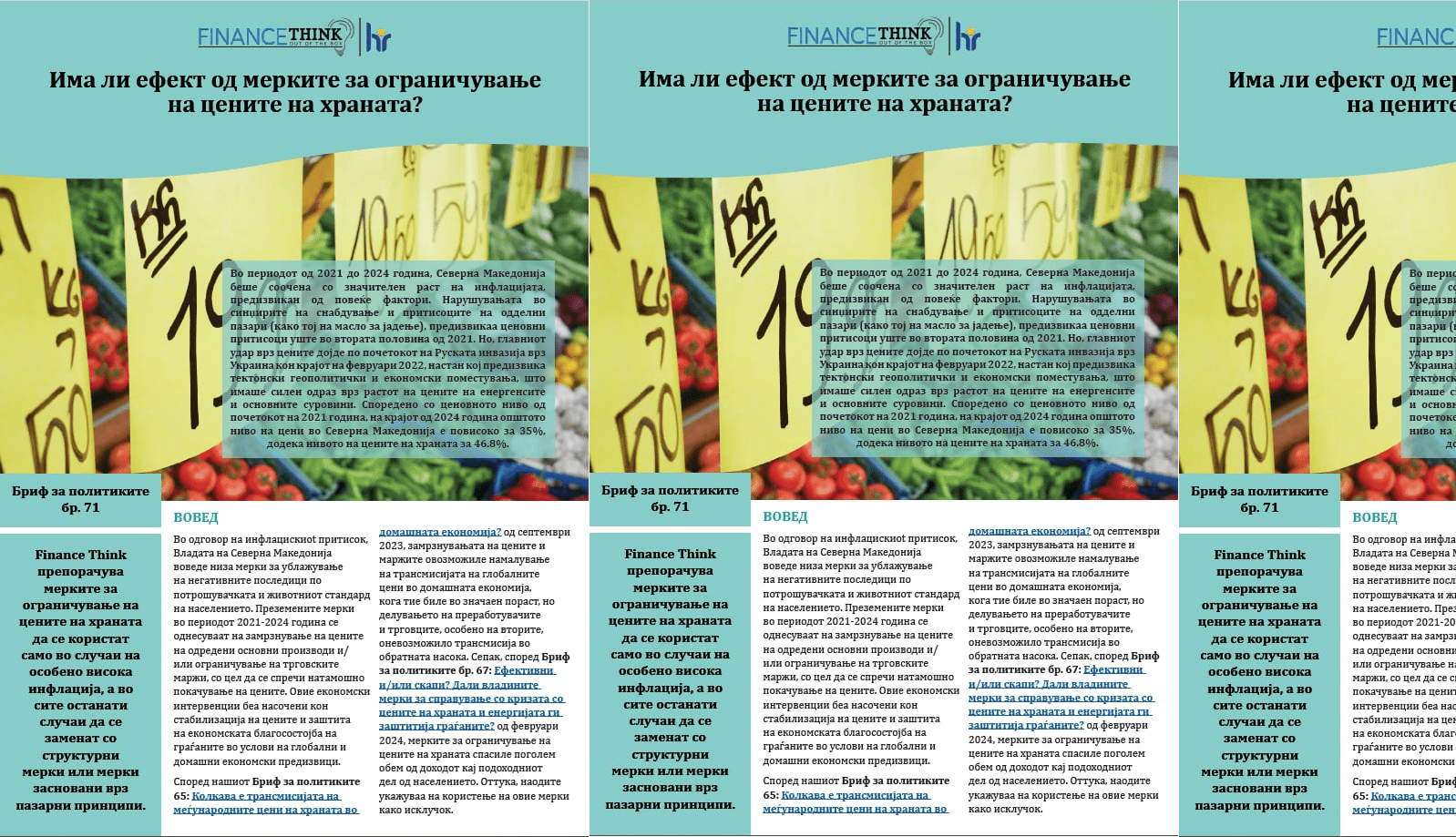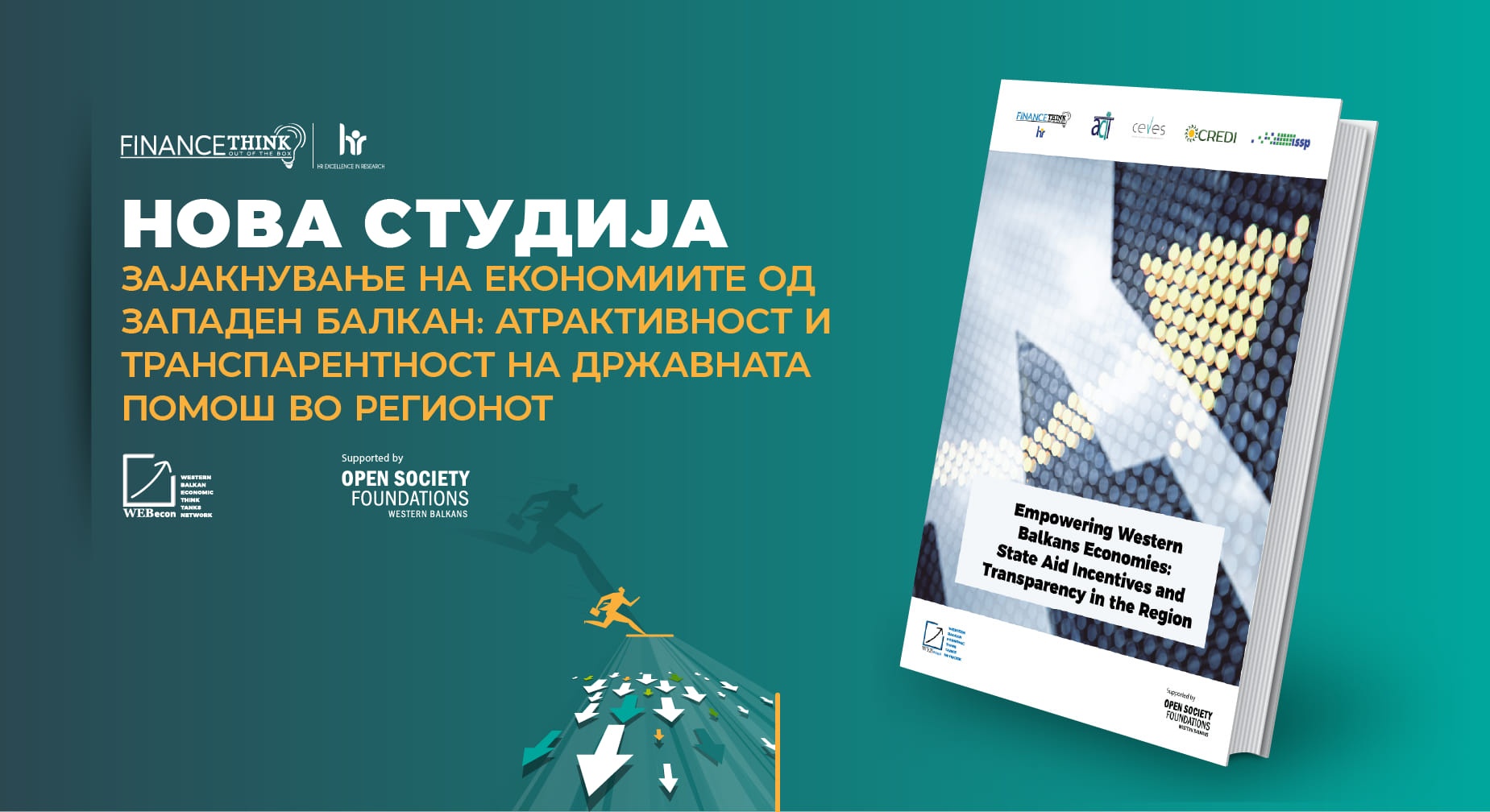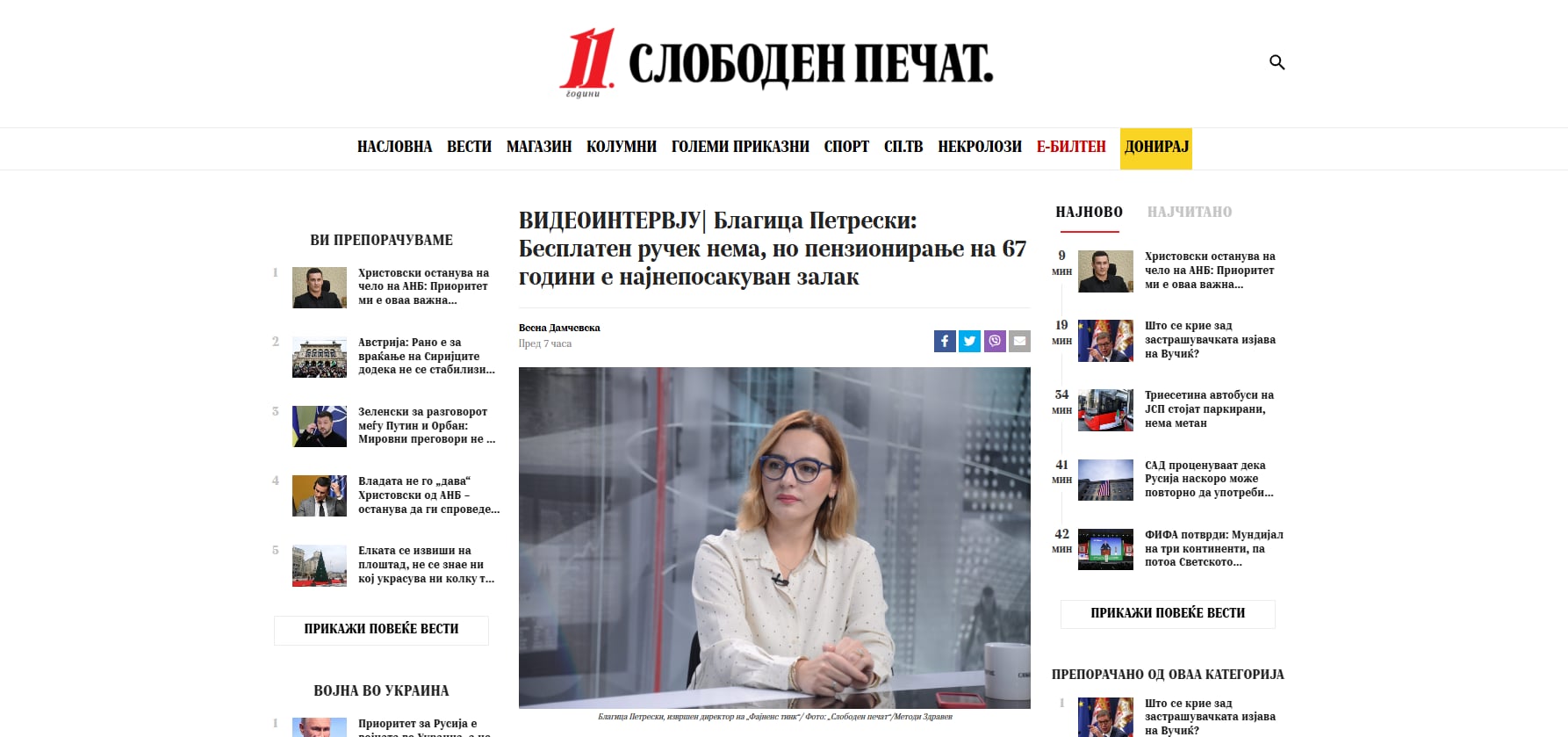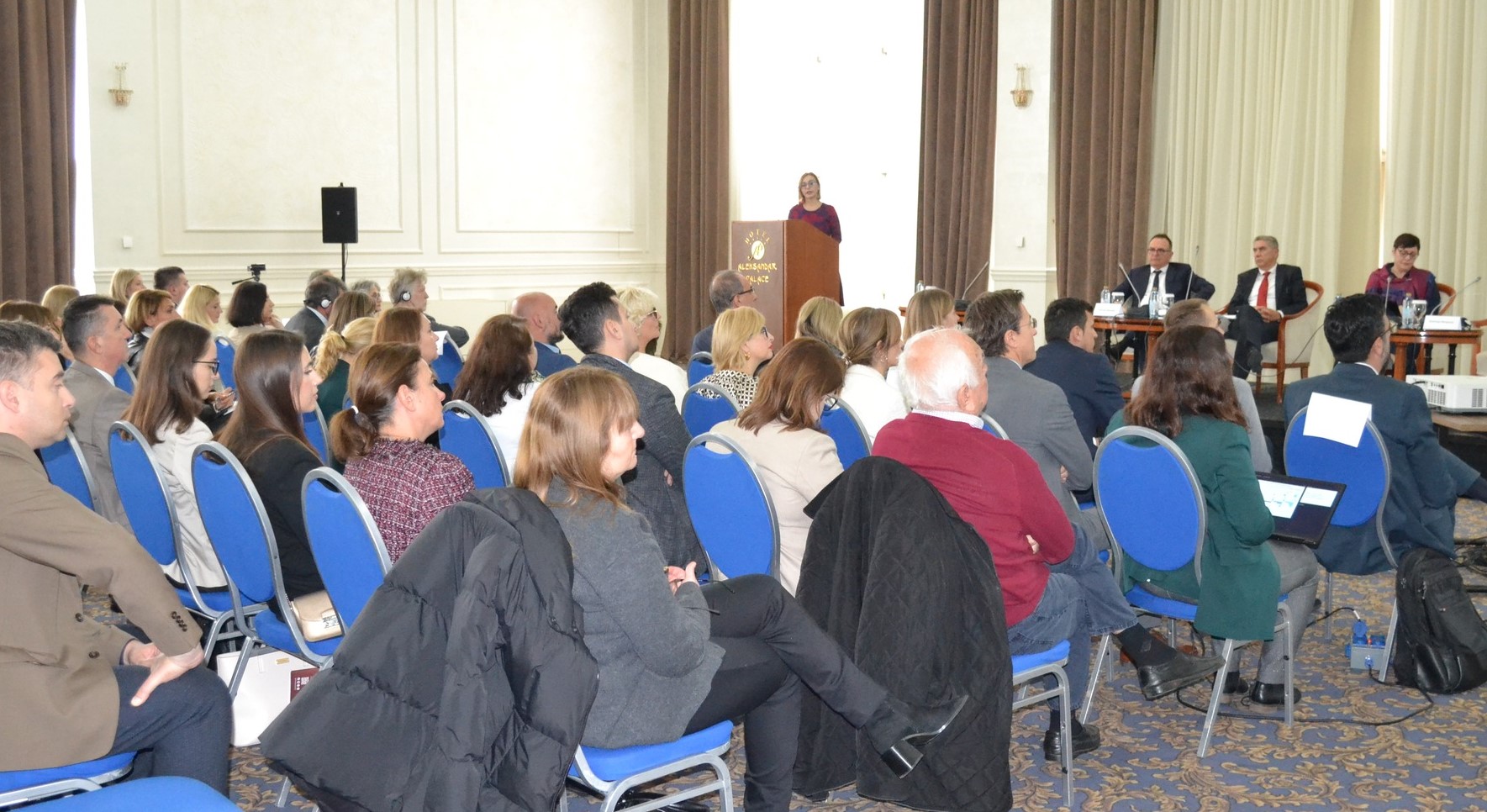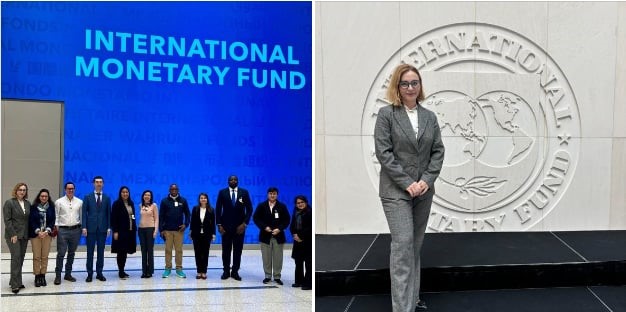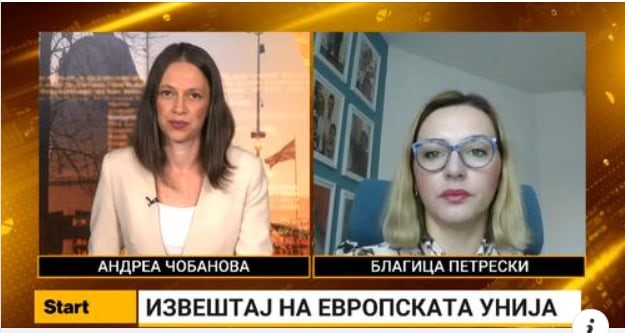Our latest 📖 Policy Brief 7⃣1⃣ answers the question: Do government #measures to limit food prices have an effect ⁉
1️⃣ Measures to limit food prices have a strong effect only in the first month of implementation, reducing inflation by up to -1%! 📉
2️⃣ After the first month, the effect dissipates due to market adjustments, such as increases in the prices of alternative products. ⚖️
3️⃣ Inflation returns to its previous dynamics immediately after the measures are lifted, but there is no overshooting. 🔄
4️⃣ Finance Think recommends using such measures only during periods of very high inflation. In other cases, structural and market-based measures are needed. 🛠️
🖇 Full brief: shorturl.at/KApmC
#Inflation #Prices #TemporaryEffect #FinanceThink
🎄Finance Think Wishes You a Happy New 2025!
Our Economic Forum effectively delivered key insights on state aid management
Link to gallery.
Transparency, Scope, and Targeting of State Aid in the Western Balkans: A Key to Growth?
Finance Think has published the study “Empowering Western Balkan Economies: Attractiveness and Transparency of State Aid in the Region.” The link to the full analysis is available here.
The goal of this study is to examine the types, amounts, and measures of state aid provided by the governments of the six Western Balkan countries to domestic and foreign companies, aiming to foster innovation, technological advancement, productivity, and more.
State aid in the Western Balkan countries ranges from below 0.5% of GDP in Kosovo and Albania to 5.9% of GDP in Serbia (2022 data). North Macedonia allocates state aid amounting to 1.9% of GDP or €253 million (Figure 1).
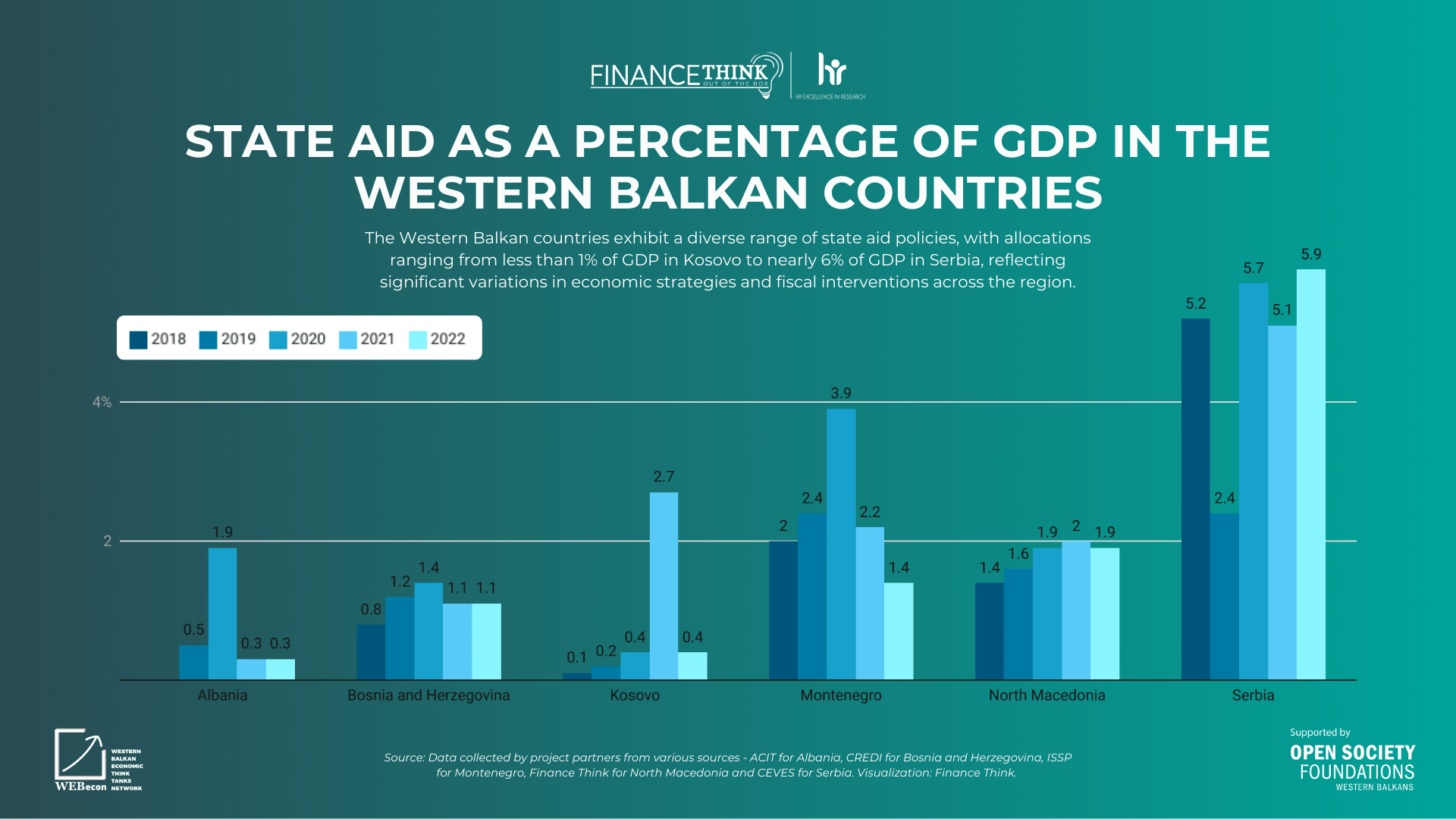
In general, all countries have numerous state aid measures targeting three segments: farmers, domestic companies, and foreign companies. To some extent, these measures are similar across the countries, especially those aimed at farmers and foreign companies operating in free economic zones. Low transparency and lack of information regarding the measures and the amounts of allocated aid are additional commonalities among the analyzed countries.
More specifically, the results show that state aid allocated to farmers accounts for more than half of the total state aid in four countries (Kosovo, Bosnia and Herzegovina, Montenegro, and North Macedonia). On the other hand, this aid cannot be linked to increased agricultural and livestock production, suggesting the need to reassess the purpose, model, and distribution methods of such aid. For example, in North Macedonia, a significant reduction in livestock production aid has been observed over the past two years, while meat production has consistently increased. Although aid for plant production support varies from year to year, vegetable production remains relatively stable.
State aid targeting domestic companies varies between countries, particularly in terms of the sectors being supported. More than half of the aid for domestic companies in Albania is directed toward manufacturing and tourism. Serbia is the only country allocating a larger portion of state aid to the development of small and medium-sized enterprises. In North Macedonia, over 90% of the aid is allocated across all sectors, with the remainder targeting manufacturing, energy, and tourism. Similar trends are observed in Bosnia and Herzegovina and Kosovo.
State aid should not function as a form of social assistance for companies. It should lead to increased productivity, innovation, competitiveness, job creation, and technological development for both the recipient company and the economy as a whole. An increased amount of state aid allocated to innovation correlates with an improved ranking of the Macedonian economy in the Global Innovation Index. The introduction of aid for new start-ups and spin-off companies is associated with an increased number of newly established companies. On the other hand, despite the continuous increase in aid for new employment, training, and employee specialization, labor productivity in the country has not improved.
All Western Balkan countries, except Kosovo, offer a wide range of attractive measures to attract and support foreign investors. The state aid scheme for foreign investors in North Macedonia is rated the most transparent, straightforward, and attractive compared to other countries. All foreign companies, regardless of location, can utilize the measures outlined in the Law on Financial Support of Investments, which, according to the analysis, account for two-thirds of state aid allocated to foreign investors. For the other analyzed countries, data on aid for foreign investors is incomplete (Serbia and Albania) or non-existent (Bosnia and Herzegovina and Montenegro), highlighting the need for increased transparency among the institutions responsible for managing and overseeing this type of aid.
The recommendations from the analysis are focused on three segments:
- Improving regional cooperation to align state aid policies, enabling a more integrated market that can attract cross-border investments and stimulate regional development. This can be achieved through joint initiatives, sharing best practices, and creating regional funds addressing common challenges.
- Focusing state aid on strategic sectors by promoting innovation, digitalization, and sustainability. In the future, aid should target sectors such as green technologies, renewable energy, and digital infrastructure, positioning the countries as competitive players in the global market.
- Enhancing transparency and accountability of relevant institutions by introducing more robust mechanisms for monitoring and reporting the types and amounts of state aid allocated.
In a video interview for Sloboden Pechat, Blagica Petreski discusses current economic topics
The whole interview here.
A panel debate on fiscal discipline and sustainability successfully concluded!
A link to the media release.
A link to gallery.
Challenges and Opportu-nities for Fiscal Discipline in North Macedonia: Insights from the Latest Study
The Fiscal Council of the Republic of North Macedonia and Finance Think – Economic Research and Policy Institute organized a debate where the findings of the study “Fiscal Discipline and the Efficiency of Fiscal Rules in North Macedonia: The Path to Sustainability” were presented. The analysis covers the period from 2008 to 2024. Data on public debt, budget revenues, and expenditures are sourced from finalized accounts, while projections for 2024 and the period up to 2029 are based on the Fiscal Strategy for 2025-2029.
Key findings of the study:
- Fiscal Rules: Introduced through the Budget Law of 2022, these rules limit the budget deficit to 3% of GDP and public debt to 60% of GDP. The rules are self-imposed restrictions by policymakers aimed at ensuring fiscal stability, maintaining optimal levels of public debt, contributing to macroeconomic stability, and promoting long-term sustainable economic growth. Although these rules were not applied during the analyzed period, the authors evaluated how fiscal policy might be assessed if these rules were enforced, providing valid insights into the management of public finances in the future.
The implementation of fiscal rules encountered certain challenges. During the analyzed period, total public debt (excluding overdue unpaid obligations) increased at an average annual rate of 7%, surpassing the threshold of 60% of GDP by the end of 2023. By the end of 2024, the debt is projected to reach 66.4% of GDP and 70.8% when including overdue unpaid obligations. Additionally, in more than half of the analyzed years, the deficit exceeded the fiscal rule of 3% of GDP. Frequent revisions of initial targets highlight weaknesses in accurate planning, overly optimistic revenue projections, and difficulties in expenditure management. This narrows the space for countercyclical policy and medium-term crisis buffers.
- Medium-term Fiscal Strategy: Although fiscal strategies set targets for budget deficits and public debt, frequent revisions undermine the credibility of these goals, making consistent achievement of fiscal objectives impossible. Consequently, annual planning focuses on short-term measures, rendering budget projections vulnerable.
- Pro-cyclical Policy: The analysis revealed that expansionary fiscal policy was applied throughout the analyzed period. In this context, fiscal policy was not used solely for countercyclical purposes to stabilize economic cycles but also to maintain high aggregate demand. This led to increased expenditures in the form of budget deficits and higher public debt. Expansionary fiscal measures during periods of economic growth further increased public debt, reducing budget flexibility during economic crises.
Short-term fiscal policy fluctuations were also identified, correlated with the political election cycle.
- Long-term Expenditure Growth: The growth of fixed expenditures, particularly current ones such as salaries and pensions, outpaced revenue growth and real GDP growth. This poses a risk of increasing the structural budget deficit and necessitating further borrowing.
Event Details:
Managing these risks was the focus of the event, which was organized into two panels.
- In the first panel, Minister of Finance Dimitar Kovachevski, through a presentation of policies in the Fiscal Strategy 2025-2029, highlighted the mechanisms and tools for addressing these risks, the dynamics of fiscal consolidation, and alignment with fiscal rules.
- Members of the Fiscal Council emphasized the need for policies and reforms in public finance aimed at managing the structural budget deficit and restructuring public expenditures.
- Representatives of Finance Think stressed the importance of applying the rule of countercyclical fiscal policy.
- A representative from the EU Delegation shared experiences with fiscal rules in the EU, recommending that North Macedonia, as a future EU member, prepare for their implementation.
- A World Bank representative shared insights on fiscal rules in the Western Balkans and emphasized the need to create fiscal space during periods of economic growth to build buffers for crisis periods.
- A representative from the Macedonia 2025 business community stressed the need for predictable fiscal policies and effective application of medium-term fiscal strategies.
🔴 On Friday, we #debate on an important topic, with #key stakeholders
The initiative is conducted by Finance Think and the Fiscal Council of ![]() .
.
Executive Director Blagica Petreski Selected as an IMF Academic Fellow
🎉 Executive Director Blagica Petreski Selected as an IMF Academic Fellow! 🌍
This prestigious recognition is not only a personal achievement but also a significant opportunity for Finance Think to transfer knowledge, innovate new topics, and implement the latest global economic trends. 📊💡
This experience continues Finance Think’s successful mission of shaping innovative policies and research! 🌟
EU with Sharp Criticism of Fiscal Policy – Discussion on Bloomberg
Link to the interview.

